HIT CHANNEL EXCLUSIVE INTERVIEW: March 2023. We had the great honor to talk with a legendary bassist: Leland Sklar. He is best known for his work with James Taylor, Phil Collins, Toto, Jackson Browne and Billy Cobham. He has also played with Crosby Stills & Nash, Linda Ronstadt, Barbra Streisand, Dolly Parton, Ray Charles, BB King, Leonard Cohen, Joe Cocker, Alice Cooper, Giorgio Moroder, Donna Summer, Diana Ross, Steve Lukather, Nils Lofgren, Donovan , Roger McGuinn, Shawn Phillips, The Doors, Art Garfunkel, Don Henley, Mike Oldfield, Santana, Rod Stewart, Eros Ramazzotti, Anna Vissi and many others. In 2020, he published “Everybody Loves Me”, a coffee table book containing 6.000 photos of fans, common people and famous musicians giving him the finger. The Immediate Family, the band he formed with old friends and collaborators Danny “Kootch” Korchmar (guitar, vocals), Waddy Wachtel (guitar, vocals) and Russ Kunkel (drums), have a new single out called ““The Toughest Girl In Town”. Read below the very interesting things he told us:
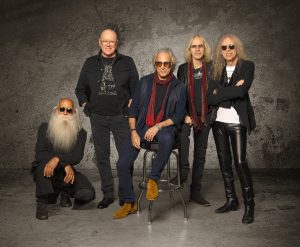 “The Toughest Girl In Town”, a Sparks cover, is the latest single of The Immediate Family. Why did you choose that particular song as the first single from your next album, “Skin in the Game”?
“The Toughest Girl In Town”, a Sparks cover, is the latest single of The Immediate Family. Why did you choose that particular song as the first single from your next album, “Skin in the Game”?
Actually, Waddy Wachtel (ed: Warren Zevon, Keith Richards, Ringo Starr – guitars) chose it. He got into listening to a bunch of Sparks tunes, we all really like Sparks, and he was listening to them and that tune really touched him. So, he brought it to the rest of us and he said: “Let’s do this!” and we said: “Great! Let’s do it!” and it just felt right. It was a fun tune to do and we did a nice video with it and everything, but it was basically driven by Waddy Wachtel from the group.
Are you satisfied with the response you got from fans during the recent Immediate Family tour?
Yeah, the people who have started following the band are really wonderful, they ‘ve been great. It’s a really loyal group of fans and our fanbase it’s interesting because they are fans of a new band, which is The Immediate Family, but they are also fans of each of us individually, which goes back 50 years. So, it’s a really interesting relationship with them. They look at us as a group but they also look at us as the individuals that they have done other things that they enjoy. It’s great.
Could you give us some info about the next Immediate Family album “Skin in the Game”?
I think it has been about a year and a half, I guess, since we finished the album but with the problem we had in the whole world and over here with Covid, everything changed in terms of release dates and availabilities to go out and promote and do things like that. So, at this point we are still talking to the label about when to release the new album, but we are very happy with the album. It’s another growth level from the last album and we are very proud of it, but we are just looking forward to sharing the album and a lot of it has to do with the documentary movie that Denny Tedesco has made about the group. They try to see if they can make the movie and the album come out together. So, there are some things that are being done, but we are anxious, we are excited about the album.
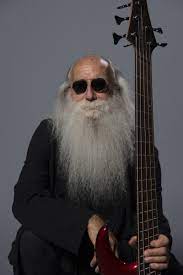 I listen to great tracks from your debut Immediate Family album (2021) such as “Everything That’s Broken” and “A Thing from the Past” and I wonder how you managed to record the whole album in just three days. I thought this is a lost art nowadays.
I listen to great tracks from your debut Immediate Family album (2021) such as “Everything That’s Broken” and “A Thing from the Past” and I wonder how you managed to record the whole album in just three days. I thought this is a lost art nowadays.
Yes, it is somewhat of a lost art. We prepared, we knew what we wanted to do. If you go in the studio and you are about 90% prepared, then the last 10% you can adjust in the studio, once you are listening back to the recording. I mean, we did all the tracking in three days, the guys went into Steve Postell’s (guitar, vocals) studio, just to do some maybe solos in order to work on, things like that. So, ultimately, it took a little over a week, but I’ve done many records. I mean, one of my favourite albums I ever played on, is Billy Cobham’s (ed: Miles Davis, Mahavishnu Orchstra – drums) “Spectrum” (1973) album and we did that album in two days.
You and the other members of The Immediate Family have been friends for decades. Does this fact make it harder to separate the professional from the personal aspect of the things or it’s actually easier because you all know very well each other?
I think it’s easier. I think we ‘ve known each other for 50some years now. When I do a project with new people, there is a little bit time you spend trying to figure them out and they are figuring you out, adjusting. When we get together as Immediate Family it’s just like this (ed: he snaps his fingers), immediately. We already know each other so well. The very basic things are already in place, so when you get together, it’s fine tuning, it’s details at that point rather than the whole picture. So, actually having the relationship that we have for so many years makes getting together so comfortable and easy. It works. One of the reasons that we were able to record so quickly is because we fall right into place immediately when we work together. Being on our album or anybody else’s album that we are working on is kind of the same situation.
There are still screenings in the United States of the Immediate Family Film. How would you persuade a music lover to watch this film?
Well, they can’t watch it until it is released. The screenings are always just separate from what the public can see. They just had a screening in Sedona, Arizona and they said that it went really-really well and in a number of screening the movie won the audience favourite award. What happens with screenings is this is to get a buyer, to buy the movie because they had investors. I mean, the movie is made and it is all finished, so now they are looking for a buyer who would be the distributor and once that happens, then we can announce that it will be coming out and everybody can see it at that point, be it in theatres or on streaming platforms, things like that. But that’s a part of it that we don’t have anything to do with. This is what the filmmakers are dealing with all this right now, but as soon as it’s done in terms of distribution, then we’ ll let everybody know that it will be available for them to see. I ‘m really proud of it, it’s really a beautifully made film, it’s surprising. You never think there is gonna be a movie about you (laughs), but it turned out really fantastic.
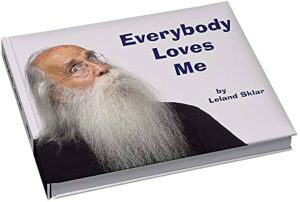 How did you come up with the idea to publish “Everybody Loves Me” book, in which you took photos of people giving you the finger?
How did you come up with the idea to publish “Everybody Loves Me” book, in which you took photos of people giving you the finger?
I’ll try to make it brief because it’s a long story. When I was out touring with Phil Collins in 2004, there was talk at the end of the tour that Phil was probably gonna retire at the end of that tour. He was tired and just thought he would call it quits at that point. It was a big production, we had probably 100 crew people on the tour and I thought I may never see any of these people again if he retires because his tour was what brought us all together. I thought I would take pictures of everybody on the tour for just like a memory book for myself and the first person I got a picture of was my bass tech, a guy named Steve Winstead. I went over to him and he was working on his laptop. His nickname was “Chinner”, so I said: “Hey Chinner, give me a smile” and as he is typing away and he goes (ed: gives me the finger on Zoom) and I took the picture and then I looked at it and I went: “Oh, that’s good. I like that”.
So, I went and got Phil and Tony Smith, his manager, everybody in the band, everybody in the crew, caterers, bus drivers and I had everybody giving me (ed: gives the finger)… and I put it away and then two years later, I did my first tour with the band Toto and I went and got all those guys to do it, too. Then, it just took on a whole life of its own. As of right now, the book has 6.000 pictures in it, but I ‘ve got over 13.000 pictures of people. So, in the book I’ve got Charlie Watts (ed: Rolling Stones –drums), Jeff Beck, Phil Collins, James Taylor and Bonnie Raitt, just all kinds of people, plus regular, everyday people that I would meet. I probably would have never done the book if it wasn’t for Covid, because all of a sudden, there was no work. Everything was shut down and I met with a friend of mine who had a publishing company, it does fine art work and we talked about it and he said: “Let’s just do it!” So, we made this book and it’s a real high end quality coffee table book. It’s a big book and everybody that has got one so far, just loves it. They said: “People come over and they start looking at it and they become completely absorbed in it”. It was a lot of fun. It was a funny thing to do.
Could we say that your participation in James Taylor’s “Mud Slide Slim and the Blue Horizon” (1971) was the turning point in your career?
Yeah, I would say that album, but just my whole relationship with James, it changed my life overnight. Literally, almost in a week I went from being a college student to becoming a first call studio musician, having never recorded before. I had only been in a studio to do demos with the band I was in in 1968 or ’69 (ed: Wolfgang –see below). It was a massive life change. So, I think what I owe the most to is to James Taylor and to Peter Asher, who was producing and managing James, because Peter was the first person to put musicians’ names on an album jacket. The Wrecking Crew and all the great musicians of the ‘60s and the late ‘50s, they worked on everybody’s records, but they never got credits, so nobody knew who they were, but with James, Peter put our names on it. Then, all of a sudden, the singer-songwriter movement began and they would look at James’ records thinking: “This is the biggest guy in this genre right now and those are the guys that played on his record, so let’s call them”. So, all of a sudden, Russ (ed: Kunkel –drums), myself and Kootch (ed: Danny “Kootch” Korchmar –guitar, producer) were getting calls right and left, so we were suddenly went from never pretty much recording to doing three sessions a day, six days a week. I mean, for me, it’s like 25-26 hundred (2.500-2.600) albums. So, it was crazy how it all happened but I’m grateful everyday for it.
How much has your perspective on bass changed over the years?
It really hasn’t. My whole idea what bass is all about and how I play: I adjust my playing for each project, but it doesn’t change that much if I’m doing a country album and then I am doing a funk album, then I am doing a metal album. I have to change a little with the genre, but my playing doesn’t change that dramatically. I ‘ve been pretty straight ahead through everything. My tone doesn’t change that dramatically, maybe it’s stylistic changes just for the different style of music.
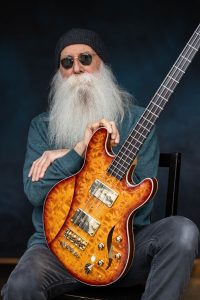 Do you have any memories from the 2005 Phil Collins show in Athens, Greece?
Do you have any memories from the 2005 Phil Collins show in Athens, Greece?
Oh yeah, I loved it. I’ve been to Greece a couple of times now. I was there with Tracy Chapman one year and I’ve done albums with Demis Roussos and Anna Vissi, but when we got there with Phil it was exciting. I mean, that was an incredibly exciting tour, but every chance I ‘ve ever had to be in Greece I really enjoyed it, just because I’m a history buff and there is hardly a place on this planet that can match Greece for history. As a matter of fact, I’m on the road right now and as soon as I get home, my wife is heading to New York for a week and her wonderful best friend lives in Athens and she is flying over to New York and they are gonna spend a week. So, we feel connected. One of my best friends, his name is Tony Alexakis and he talks Greek all the time. But I loved it with Phil, we had a great time there.
I love your playing on Billy Cobham’s “Spectrum” album. Are there any stories you would like to share with us from those sessions?
Well the thing that was exciting about that was: We had a band back in the beginning of the ‘70s called The Section, which we were James Taylor’s and Jackson Browne’s band, but we were like a rock fusion band and one of the tours that we did was opening for Mahavishnu Orchestra. So, doing that I became friends with Billy Cobham. When Billy got his record deal he called me and asked me if I would come to New York to do his album, but the thing that was exciting was that the band that was in when I met James Taylor, was a band in LA called Wolfgang and our manager, one of the other acts that he was managing, was a band called Zephyr and Tommy Bolin was guitarist in Zephyr, so I knew Tommy from back in the late ‘60s and when I went to Electric Lady Studios to start Billy’s album, I walked in and there was Tommy. I had no idea Tommy was gonna be on the record. He is still to me probably one of the greatest guitar players ever. So, it was thrilling. I mean, Billy’s thing went by so fast. Literally, we cut those like one or two takes of everything in two days and then we were done. So, it was just raw energy and Billy is one of the greatest drummers who have ever lived and Jan Hammer (ed: Mahavishnu Orchestra, Jeff Beck) is one the greatest keyboard players. It was exciting. I mean, I still think about it and if I go anywhere, if I walk into a studio and I start going “doo-doo/doo-doo/doo-doo” (ed: the melody from “Spectrum” song), everybody jumps on it and it turns into a big jam. So, we cut it in 1973 and here we are in 2023 and it still stands up until today.
Your chemistry with Tommy Bolin on “Spectrum” is spectacular. Were you impressed with his talent?
Really Tommy was probably one the greatest guitar players I have ever worked with and a really sweet guy. Since I had known him, since the late ‘60s, he was just a brilliant musician and just a great guy. I mean, I was impressed with him since he was in Zephyr and he was just one of those guys as soon as he picked up his guitar and played, you just went like: “Yeees! This is great”. So, I loved Tommy. I missed him.
You had done many albums with David Crosby (solo, Crosby Stills & Nash), who recently passed away. Would you like to tell us a few words about him?
Well, I met David Crosby when I was in college. Right near the college there was a big fairground and there was a concert there one day and I went to see Jimi Hendrix play. I was standing there watching Jimi Hendrix and I looked next to me and there was David Crosby and I said “Hello” to him. He didn’t know who I was, I was just a punk kid there, but when we first really got together was probably the first Crosby & Nash album (“Graham Nash David Crosby” -1972), and we hit it off immediately. David was such a great singer and such a great writer and musician and so, I ‘ve really enjoyed all the years. Actually, I would probably have been doing some work with him right now, if he hadn’t passed away, because he had put a new band together with Steve Postell, he was part of that. We were gonna be splitting bass duties myself and Hutch Hutchinson who tours with Bonnie Raitt. So, we were both saying: “Well, when you can’t do it, I will do it and when I can’t do it, you ‘ll do it”. We were all excited about going out with David and then tragically he passed away. But over all these decades, I’ve loved working with solo Crosby, Crosby & Nash, Crosby Stills & Nash, Crosby Still Nash & Young. It’s been a great-great relationship and he is definitely one of the more fascinating people I’ve known in this business over the years.
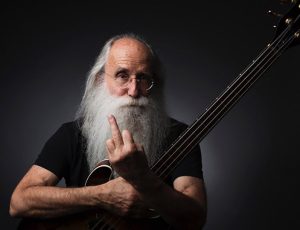
How much artistic freedom do you have as a session musician?
Depends on the project. Sometimes I go in and every note is written out like for doing movies or television or commercials or even some album projects. They have been planned ahead of time and they have pretty much everything planned out. Many times I’ ll go in and there will be music written and they will say: “Ok now, make it yours”. So, they can have you add some subtleties. Other times you just go in there is just a chord sheet or there is nothing and it’s all up to you, but generally most of my work is left up to me. They have me come up with the bass parts. Sometimes, I will do a project and they will have a bass part in mind or they play me a demo that they have made or something and I ‘ll try to make it as close to that as I possibly can, because that’s what they came up with. But sometimes I will say: “Now, could you give me one more take and let me try it the way that I hear it?” and there are times when we’ll do that and they ‘ll go: “That’s great. You just make the record. We love it” or other times they’ll say: “We will use what we already had”. So, I just do that. I don’t really worry about that. I just try to give them a performance that the artist and the producer are happy with and just try to be as creative as a can within the format.
Could you explain to us your “never say ‘no’ to anything” philosophy on music business?
First off, there are a lot of guys who when they talk about what they do, they only talk about: “What if I just talk about Toto, Phil Collins and James Taylor?” You know, they talk about only the big sessions that they have done. I get calls all the time to do things that you may never ever hear, but I don’t say “no” because first off, I like working and not all the big artists are working all the time. So, I don’t say “no” to work; the only thing that would it make me say “no” is if I am already busy on that day. But even if the project isn’t good, I ‘ve met some unbelievably great musicians on projects like that that I didn’t know about. So, I say “yes” to a session and I show up and I might meet a new drummer who then if somebody calls me after that, I ‘d say: “Call this drummer. He is amazing. You ‘d love him”. I don’t say “no” because you never know what is around the corner. There can be an adventure every day if you take it all in. I try to never turn anything down. I mean, I’m on this tour right now and there are two album projects that were going on during this, that I would love to have been able to do but I ‘m already on the road, so I had to say “no”. That’s the only reason I would say “no”.
What was it like to work with Giorgio Moroder and David Bowie on the song “Cat People (Putting Out Fire) from the “Cat People” soundtrack in 1982?
The only thing that would have made the session better is if David had been there, but I was just working with Giorgio, we were only recording tracks. So, I would love to have been in the same room with David, it would have been great, but I did a number of projects, I ‘ve done some Donna Summer’s work and things with Giorgio and Giorgio was always a treat to work with. So, I love working with him. I mean, in that project turned out really good. It would have just been more fun had Bowie been in the room with us doing it, but I think when we were cutting in Los Angeles, he was in England. So, he did his vocals afterwards.
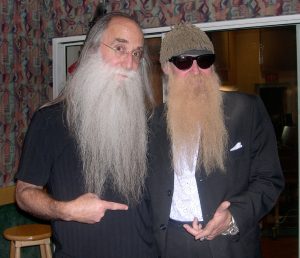 Did you get an offer to join ZZ Top after Dusty Hill’s death?
Did you get an offer to join ZZ Top after Dusty Hill’s death?
If Billy (ed: Gibbons –guitar) would have called me, I would be out on the road with him, right now. I know Billy and I mean, I felt really bad about Dusty’s passing. He was ZZ Top, the three of those guys. So, when he passed everybody was saying to me: “Are you gonna get the call? Are you gonna get the call?” (laughs) and I went: “Well, I don’t know” and it really worked out perfectly the way they did with Dusty’s tech (ed: Elwood Francis), who is also a bass player. So, he took right over, he already knew the whole show and everything and he had a beard, so it worked out fine. If you would have asked me, I ‘d have jumped on it. I love ZZ Top, I’ve seen them live and they are one of my favourite bands. Just a really good bar band (laughs).
Keith Emerson told me: “The music in the ‘60s and ‘70s was more important to people. It was a huge event when The Beatles had a new album out. You should listen to Paul McCartney’s bass, you should listen to John Lennon’s lyrics. Nowadays nobody gives a shit about who the guitar soloist is on Lady Gaga album”. Do you agree with this?
To an extent, I do. First off, there is great music still being made, so I don’t look that like the ‘60s and ‘70s, back then and that was the end of the great music. There is great music being made all the time. It’s just the whole business; everything is different now. Back then, it was real adventure and listening to music was an adventure, because you had records. So, it was a big deal to get that record and go home and your friends would come over and you would all sit around and listen to music, when now so much of it it’s just streaming and people’s musical experience is basically with earbuds and not with big speakers and amplifiers. It’s a very different way of approaching music nowadays where making an album, an actual, physical LP was a very important process in terms of how do you start side A, how do you end side A, how do you want to begin the second side, when now a lot of people they just pick one song or two of the thing and they just put them on repeat and that’s all they listen to or they change the order of the album where the order of the album was really important to us and the time between songs was important. You were gonna wait, you were gonna butt them look closer, you were gonna let a little time go, so people can rest before that. So, it’s a different situation, but I still find great music and I still find great musicians. The musicianship level of people has got astounding. You watch Youtube and you see 5-year old kids that are playing like Jimi Hendrix (laughs), something that is mind-blowing.
In 1969 as a member of Wolfgang, managed by Bill Graham, you opened for Led Zeppelin. Had you realized then the significance of that moment or it was just another concert for you?
It was the very first time we ever were on stage as a band. We had never played a gig before that show. So, it was kind of intimidating to say the least, to be going out opening for Led Zeppelin at Winterland in San Francisco. It was thrilling. I mean, we were not nervous because we were well-rehearsed but we were anxious and excited. We knew this was something thrilling that we were taking in at that moment and I look back at it now and it was a great way to get things started (laughs). You never know what’s around the corner, so that’s a great memory to look back on.
Why is there no competition among bass players? I mean, you, Tony Levin, Nathan East, Billy Sheehan, Victor Wooten, you all love each other.
Oh yeah! It’s a community. It’s not a competition. There is enough stuff for everybody is busy and doing what they enjoy doing and also we all really appreciate each other. I mean, when I sit and watch Billy Sheehan play, I just sit back and I go: “Oh, wow!” and then I see Victor Wooten play and it blows your mind completely. We each have our own thing and we appreciate that. Because I ‘ve done many bass camps and things like that with Victor, I sit there and I look at him like going: “You are unbelievable” and he goes: “You are unbelievable”. I mean, we each admire and appreciate what each other does. I got called for things in the past where they wanted me on it, like back in the day and I would go: “You know, John Patitucci (Chick Corea, Wayne Shorter) would be better for this” and I just said: “Call him. I can do it but he’ll be better”. We all try to share what is best for the projects. You know, you hear a lot about the guitar players and all this stuff; bass players it’s a different kind of community, they all support each other and appreciate each other. So, I feel pretty proud to be just a member of that community.
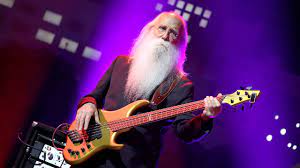 Was it an interesting experience having Ron Carter (Miles Davis Quintet –bass) asking you questions on Zoom in 2021?
Was it an interesting experience having Ron Carter (Miles Davis Quintet –bass) asking you questions on Zoom in 2021?
(Laughs) Yes. I mean, I stay in touch with Ron on a real regular basis. He and Ray Brown (ed: Oscar Peterson, Ella Fitzgerald –bass), those guys are such iconic players, especially in their genre, in the jazz field. Ron’s credibility is like nobody else’s and he is the most wonderful man to talk to and to spend time with, so when I was talking to him on that thing it was kind of intimidating a little bit. You were going in the back of your mind: “It’s Ron Carter. It’s Ron Carter” (laughs). The thing that was fun was on Billy Cobham’s “Spectrum”, he played on two of the tracks. We recorded all of our tracks on Monday and Tuesday and then on Wednesday I flew back to Los Angeles and Tommy (ed: Bolin –guitar) flew out and then they did the two kind of big band songs on Wednesday. But Ron and I, we joke about that we got to share Billy Cobham together. He is great, he is wonderful. I was so thrilled when he said he wanted to get together and do a conversation for Zoom. So, it was great.
You are always busy. Do you have time to spend your money?
No, my wife does. I love working. I mean, I’m touring right now with an artist named Lyle Lovett and we are down in Florida right now and we ‘ve got about another a week and a half of the tour. We ‘ve been out for about five weeks and then we have some work in April and then we’re gonna be out from the middle of June till the middle of August in the States. I love working. To me, working is the greatest reward playing music. So, I’m not a spender, I don’t go out and buy much, it’s almost like the income is secondary because that comes with the gigs, but the gigs are all I really care about. So, I get off the tour, I go home on the 10th (ed: March) and on the 11th and the 12th, I have an album project to work on in Los Angeles. I just keep going. I love it.
Do you think social media like Youtube and Facebook have helped younger listeners to learn about your music?
I’m not sure in terms of younger audiences; I would imagine so. My Youtube channel , I think there are 217.000 people on the channel, but I ‘ve no idea what their ages are, anything like that. But I’m sure that a lot of them that have come to the channel are older, because they know my name from the records that they listen to. Whether or not there are a lot of younger people coming to it, I really don’t know. Every once in a while people would write and go: “Yeah, I’m 21 years old and I love your channel” and all that. But once again, with the advent of Covid, it really opened up opportunities to do things that I would never have done, if my work schedule hadn’t been cancelled due to Covid. Doing the Youtube channel has been really fun; I ‘ve got 1050 videos up to now, I think and I will do another one today. I love it. I really enjoy it. It was a little bit easy to do during Covid, only ‘cause I had nothing else going on. Now, that things have opened up and we are touring and recording again, my schedule is really full now ‘cause I ‘m not giving up the things I did during Covid, but I’m back to doing all the things that I did before Covid. So, my days are much more filled at this point but I don’t want to give up any of these things because I enjoy them so much. But the advent of social media, it’s really remarkable. I mean, it can be really weird and dark at times, depending on the people that are on it, but for the most part I found it incredibly enjoyable; Youtube I find remarkably enlightening. I am one of those people, I don’t sleep that much, so a lot of times at night, I ‘ll be up just watching Youtube stuff all night long, seeing different artists and different things, things that I’m interested in. I ‘ll just go up and look at tutorials and stuff. It’s a remarkable time we live in on certain levels. I really try to enjoy all of it.
Why your friend Jim Keltner (ed: John Lennon, George Harrison, Bob Dylan –drums) doesn’t have an official website or a Facebook page? I can’t get in touch with him.
He just doesn’t care about it. It took just ages for him just to get a cell phone. He is one of those guys that just he… Jim Keltner is Jim Keltner (laughs). He works as much as he wants to work because his credibility is so huge and his history is so huge and [because of] the people that know and love him, he will always be working. But I think when it comes down to Facebook and all that, some guys just don’t care about it. I mean, I was one of the very last guys to get a computer and do all that because it just never interested me, I was plenty busy without it, but when it finally felt like I need to connect on another level, then I went and had to get it and figure out how everything works. But Jimmy is Jimmy and that’s all I can say. He is a unique guy.
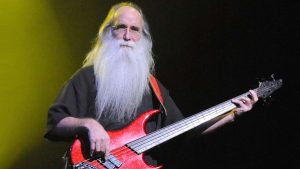 Last question: I’m a huge Jack Bruce (Cream) fan. Would you like to tell us a few words about his influence on you?
Last question: I’m a huge Jack Bruce (Cream) fan. Would you like to tell us a few words about his influence on you?
Well, when I saw Jimi Hendrix playing in 1968 when I was in college, that same year Cream played in our college gymnasium and I sat there watching Jack Bruce and he blew my mind. I was such a huge Cream fan and then all of Jack solo work. He is one of those guys: There is no way to copy him, because he was such a unique player. He also had one of the best voices in rock. I mean, he was almost an opera singer. One of the things that I was really grateful of was, before he passed away, I got a chance to meet and spend some time with him. He gave me the finger and it’s in my book (laughs). I love Jack, I love Cream but Jack was a monstrous player, a monstrous singer and a great writer. So, he definitely had an influence on me. To me almost everybody who has ever played bass that I’ve heard has an influence on me. From Jaco to the simplest bass player because there are little things in each person that you listen to and you go: “That’s great, I love that. That’s great”. So, to me it’s not all about chops. Sometimes, you know, when I listen to somebody like Duck Dunn ( Booker T. & the MG’s, Otis Redding) or Carol Kaye, Joe Osborn (Simon & Garfunkel, The Mamas & the Papas), the incredible David Hood (Bob Seger, Paul Simon, Traffic) from Muscle Shoals (ed: Alabama). They are all different and I love them all. They all affected my playing.
A huge “THANK YOU” to Mr. Leland Sklar for his time. I should also thank Lucy Sabini for her valuable help.
Official The Immediate Family website: https://www.immediatefamilyband.com
Official The Immediate Family Facebook page: https://www.facebook.com/TheImmedFamily
The Immediate Family Film website: https://www.immediatefamilyfilm.com
Leland Sklar official website: https://lelandsklarsbeard.com
Leland Sklar Facebook page: https://www.facebook.com/LelandSklarOfficial
Leland Sklar Youtube channel: https://www.youtube.com/channel/UCs5yDeiOgkyRZGZGphlSbIw

